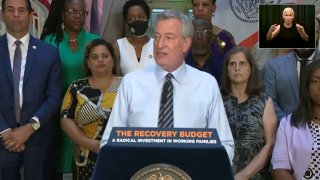
What to Know
- Mayor Bill de Blasio and City Council members announced Wednesday they have reached an agreement on the city's $98.7 billion budget for Fiscal Year 2022
- Officials hope the spending plan will drive the Big Apple's economic comeback following the impact of the pandemic.
- The budget -- dubbed by the Mayor's Office as the "Recovery Budget" -- has five goals at its core: finishing the fight against COVID-19, building on strong reserves, boosting economic growth in every neighborhood, delivering an academic and emotional recovery for every student, and keeping all communities safe.
Mayor Bill de Blasio and City Council members announced Wednesday they have reached an agreement on the city's $98.7 billion budget for Fiscal Year 2022 -- a spending plan that officials hope will drive the Big Apple's economic comeback following the impact of the pandemic.
The budget -- dubbed by the Mayor's Office as the "Recovery Budget" -- has five goals at its core: finishing the fight against COVID-19, building on strong reserves, boosting economic growth in every neighborhood, delivering an academic and emotional recovery for every student, and keeping all communities safe.
"The Recovery Budget is a radical investment in working families. It will drive economic growth in every neighborhood, all while building on strong reserves and investing stimulus funds aggressively to put the pandemic behind us, once and for all," de Blasio said in a statement. "This budget is a historic investment in New York City and it’s exactly how we will achieve a recovery for all of us."
Get Tri-state area news delivered to your inbox.> Sign up for NBC New York's News Headlines newsletter.
City Council Speaker Corey Johnson said the budget agreement "will have a positive impact on the entire city. Something..that was unimaginable 12 months ago."
FINISHING THE COVID-19 FIGHT
The Recovery Budget includes funding to finish the fight against COVID and strengthen the City’s public health infrastructure in the long term. The budget includes expanding the grassroots vaccination campaign and making investments to establish New York City as the public health capital of the world, including by supporting LifeSci NYC, a billion-dollar commitment over the next decade to create an estimated 40,000 jobs in this fast-growing sector.
News
STRONG RESERVES
The De Blasio administration partnered with the City Council to add $500 million to the City’s first-ever Rainy Day Fund, which now holds nearly $1 billion. With $2.8 billion in reserves added since June, total reserves in Fiscal Year 2022 are now $5.1 billion, with $3.8 billion in the Retiree Health Benefits Trust, $993 million in the Rainy Day Fund, and $300 million in the General Reserve.
The Adopted Budget achieves $4 billion in savings over Fiscal Years 2021 and 2022 since last June. Tax revenues exceeded expectations in Fiscal Year 2021 by $2.1 billion, driven by personal income tax and corporate tax receipts. The tax revenue forecast for Fiscal Year 2022 remains unchanged from the Executive Budget.
ECONOMIC GROWTH
The budget commits $11 million to NYC Business Quick Start, a program that will help slash red tape and help guide small businesses through City regulations. Additionally, the budget also includes the Juneteenth Economic Justice Plan to build generational wealth and tackle the racial wealth gap by expanding NYC Kids Rise with Universal NYC Baby Bonds, a program that gives every kindergartner a college savings account with at least $100 this September ($15M in FY22), and establishing four-year CUNY Scholarships at full scale for Black and low-income students ($4M in FY22), among other initiatives.
ACADEMIC RECOVERY
This budget also makes investments in New York City’s public schools to support students’ academic and social emotional needs as they recover from the impacts of the pandemic.
PUBLIC SAFETY
The administration has added more than $44 million to expand Cure Violence and the Crisis Management System since 2020. In the budget, the administration has made targeted investments to break the cycle of incarceration and reduce gun violence.
This is in addition to mental health and public safety investments from the Executive Budget including expanding mental health crisis response citywide, expanding mobile treatment teams, community-based hate crime prevention and investments in the Advanced Peace program.
This budget uses housing and employment as an anti-violence measure, including:
- Hiring 1,000 people this summer in Mott Haven, Brownsville and South Jamaica who are most at-risk– violence prevention via employment and support services through the creation of the Precision Employment Initiative ($24M in FY22);
- Providing reentry housing with healthcare and employment counseling for justice-involved New Yorkers returning to the community ($57M in FY22);
- Expanding “Jails to Jobs” to provide formerly incarcerated individuals, including those on state parole, with transitional employment ($6.6M in FY22);
- Providing peer mentorship for incarcerated individuals and those who are reentering with Crisis Management System Credible Messengers ($5M in FY22);
- Expanding the CMS-based Hospital Violence Intervention Program into new hospital locations to support victims of violence and their family and networks ($6M in FY22);
- Expanding CMS Services in the 40th and 44th Precincts in the Bronx and providing additional CMS supports ($6M in FY22)



